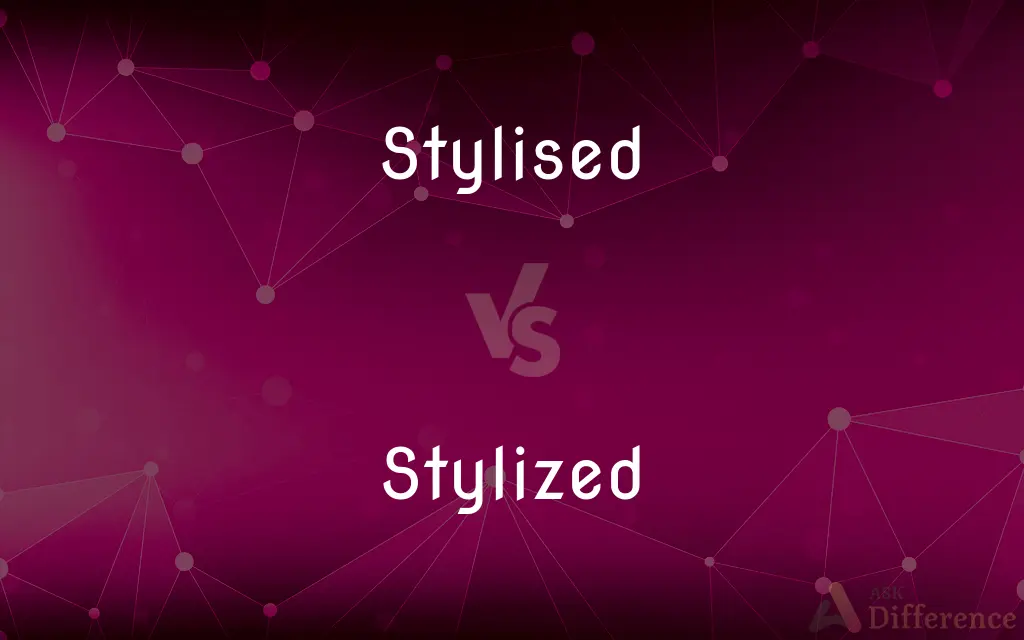Stylised vs. Stylized — What's the Difference?
By Urooj Arif & Fiza Rafique — Updated on April 7, 2024
Stylised is the British English spelling for something designed in a non-naturalistic style, while stylized is the American English equivalent.

Difference Between Stylised and Stylized
Table of Contents
ADVERTISEMENT
Key Differences
Stylised, as used in British English, describes art or design that has been altered to adopt a particular style, often deviating from natural forms. On the other hand, stylized, the American English spelling, carries the same meaning but conforms to the spelling conventions of American English.
The choice between stylised and stylized reflects not only regional spelling preferences but also influences how the term is perceived in different linguistic communities. While "stylised" aligns with British English's tendency to retain more traditional spellings, "stylized" follows the American English pattern of simplification.
In artistic contexts, whether one uses "stylised" or "stylized" can also hint at the cultural background of the work or the critic. For instance, British galleries may favor "stylised" in their descriptions, whereas American publications are likely to use "stylized".
The distinction between these spellings does not affect the meaning of the word. Both terms indicate a departure from realism, emphasizing design elements that reflect a particular artistic intention or style.
By choosing one spelling over the other, writers can align their text with either American or British English standards, ensuring consistency and clarity for their intended audience. This choice underscores the importance of linguistic precision in both artistic critique and academic discourse.
ADVERTISEMENT
Comparison Chart
Spelling
British English spelling.
American English spelling.
Definition
Describes art or design that adopts a specific style.
Same definition, different regional spelling.
Linguistic Preference
Favored in regions using British English.
Preferred in American English-speaking regions.
Cultural Implication
May reflect a connection to British or Commonwealth traditions.
Indicates an alignment with American cultural or linguistic norms.
Usage in Art Critique
Often used in British artistic and academic contexts.
Commonly seen in American art critiques and publications.
Compare with Definitions
Stylised
The act of rendering a subject in a non-naturalistic manner.
The graphic novel features stylised illustrations that complement its futuristic theme.
Stylized
Characterized by a deliberate departure from realistic portrayals.
His stylized portrayals of animals blend realism with fantasy.
Stylised
Designed in a specific style, especially one that simplifies or exaggerates features.
The artist's stylised depiction of the human form emphasizes its emotional rather than realistic aspects.
Stylized
The process of applying artistic style to elements for effect.
The animation features stylized characters that are instantly recognizable.
Stylised
Artwork that adopts a distinctive artistic convention.
Her paintings are known for their stylised landscapes that evoke a sense of nostalgia.
Stylized
Designing objects or scenes in an exaggerated or simplified manner.
The stylized set design contributed to the play's surreal atmosphere.
Stylised
Emphasizing form or design over realistic representation.
The advertisement used stylised imagery to capture the essence of the product.
Stylized
Art or design rendered in a particular style to alter or simplify its appearance.
The stylized logo captures the company's innovative spirit through abstract shapes.
Stylised
Application of style to distinguish from natural appearance.
The designer's stylised furniture collection is inspired by Art Deco designs.
Stylized
Using style to transform or enhance artistic expression.
The film's stylized cinematography adds to its dreamlike quality.
Stylised
Standard spelling of stylized
Stylized
To represent in or make conform to a particular style, especially when highly conventionalized or saliently artistic rather than naturalistic.
Stylised
Simple past tense and past participle of stylise
Stylized
Simple past tense and past participle of stylize
Stylised
Using artistic forms and conventions to create effects; not natural or spontaneous;
A stylized mode of theater production
Stylized
Made to conform to some style.
Stylized
Represented according to some convention, omitting dispensable detail, rather than in a realistic or literal manner.
The symbol for the planet Mars is a stylized representation of the shield and spear of the god Mars.
Stylized
Using artistic forms and conventions to create effects; not natural or spontaneous;
A stylized mode of theater production
Common Curiosities
What does stylised/stylized mean?
Both terms refer to the modification of art or design to adopt a specific style, often deviating from realistic portrayal.
Can both spellings be used interchangeably?
While understandable in either form, it's recommended to stick to one spelling variant based on the intended audience's linguistic norms.
Is there a difference in meaning between stylised and stylized?
No, the meaning is the same; the difference lies in the regional spelling preference.
Are there other words that follow this spelling variation?
Yes, such as "realised" (BrE) vs. "realized" (AmE), following the same pattern of variation.
Why does American English prefer "stylized"?
American English often adopts simplified spellings, hence "stylized" with a 'z'.
How should I decide which spelling to use?
Consider your audience and the convention of the language variant you are writing in, aiming for consistency throughout your text.
Is "stylised" considered incorrect in American English?
Not incorrect, but "stylized" is the preferred and more common spelling in American English contexts.
Has the preference for one spelling over the other evolved over time?
Yes, spelling preferences can evolve, but these specific variations have remained relatively stable, reflecting longstanding regional differences.
How do dictionaries handle these variations?
Comprehensive dictionaries usually list both variations, often noting the regional preference for each.
Does using one spelling over the other change the artistic critique?
No, the choice of spelling does not change the critique's content or the artistic work's interpretation.
Do style guides recommend one spelling over the other?
Style guides typically recommend choosing the spelling that aligns with the intended audience's linguistic standards.
Why is it important to maintain consistency in spelling choices?
Consistency in spelling reinforces clarity and professionalism in writing, especially in formal, academic, or published works.
Is one form more prevalent in the art world?
The prevalence depends on the region and the publication's or institution's linguistic orientation; neither form dominates globally in artistic discourse.
Are there tools to help ensure consistency in spelling choices?
Yes, many writing and editing software tools offer settings to enforce either American or British English spelling conventions.
Can the choice of spelling reflect on the writer's or artist's background?
Yes, the spelling can sometimes indicate the writer's or artist's familiarity with either British or American English norms.
Share Your Discovery

Previous Comparison
Commend vs. Command
Next Comparison
Drily vs. DrylyAuthor Spotlight
Written by
Urooj ArifUrooj is a skilled content writer at Ask Difference, known for her exceptional ability to simplify complex topics into engaging and informative content. With a passion for research and a flair for clear, concise writing, she consistently delivers articles that resonate with our diverse audience.
Co-written by
Fiza RafiqueFiza Rafique is a skilled content writer at AskDifference.com, where she meticulously refines and enhances written pieces. Drawing from her vast editorial expertise, Fiza ensures clarity, accuracy, and precision in every article. Passionate about language, she continually seeks to elevate the quality of content for readers worldwide.














































